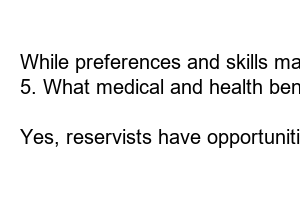예비군 준비물
Title: Reservist Preparations: Essential Steps for a Smooth Transition
Introduction:
Reservist duty is an integral part of military service, offering trained personnel the opportunity to serve their country and maintain a civilian career simultaneously. However, transitioning to reservist status involves careful preparation and planning. In this blog post, we will guide you through the necessary steps to ensure a smooth and successful shift into your reservist responsibilities.
1. Understanding Reservist Duties: Navigating the Landscape
Reservist duty encompasses various roles and responsibilities, from training exercises to emergency deployments. Familiarize yourself with the expectations, commitment levels, and potential challenges associated with reservist service.
2. Communicating with Your Employer: Building a Supportive Bridge
Open dialogue with your employer is crucial to establish flexibility and understanding in balancing your civilian job and reservist duties. Clearly communicate your obligations, discuss potential time off, and explore potential benefits offered by your workplace for reservists.
3. Organizing Your Personal Finances: Ensuring Stability
Financial stability is key during the transition into reservist duty. Evaluate your budget, create an emergency fund, and review your insurance coverage. Consider consulting a financial advisor to help navigate potential financial challenges that may arise.
4. Maintaining Physical Fitness: Being Prepared for the Challenges
Reservist duty often demands physical endurance and stamina. Develop an exercise routine that combines cardiovascular activities, strength training, and flexibility exercises to maintain overall fitness. Regular training will ensure you are prepared for physical demands that may arise during your service.
5. Staying Up to Date: Continuous Learning and Training
Reservists must stay current with essential skills and knowledge. Regularly participate in training programs, workshops, refresher courses, and workshops offered by your military unit. This will sharpen your abilities and keep you prepared for any situation that may arise during your service.
6. Establishing a Support Network: Building Strong Connections
Success in reservist duty often relies on the support from fellow reservists and understanding loved ones. Seek out opportunities to connect with fellow reservists, join support groups, and engage in military community events. Surrounding yourself with people who understand the unique challenges and experiences can provide a vital anchor of support.
Summary:
Preparing for a successful transition into reservist duty requires careful planning and taking several important steps. By familiarizing yourself with the duties, communicating with your employer, organizing your finances, maintaining physical fitness, staying updated with training, and building a robust support network, you can ensure a smooth and fulfilling reservist experience. Remember, becoming a reservist is not only about serving your country but also about balancing your personal and professional life effectively.
FAQs:
1. How long does reservist training usually last?
Reservist training can vary in duration, with weekends, multi-weekend sessions, or extended annual training periods ranging from several days to several weeks.
2. How does reservist duty impact my civilian job?
Employers are required by law to provide support and job protection for reservists during active duty periods. Communicating early and openly with your employer will help ensure a smooth transition and provide clarity on leave options.
3. Is reservist duty a paid commitment?
Yes, reservists are compensated for their service, including pay for training, deployments, and benefits, varying depending on rank, length of service, and specific duties performed.
4. Can reservists choose their deployments or assignments?
While preferences and skills may be taken into consideration, deployment and assignment decisions are typically made by the military unit based on operational needs.
5. What medical and health benefits are available to reservists?
Reservists are eligible for healthcare coverage during active duty periods and may also have access to continued health coverage through certain insurance options during non-active periods.
6. Can reservists pursue advancement and higher ranks?
Yes, reservists have opportunities for advancement through promotions and increased responsibilities. Additional training and qualifications may be required to progress in rank.

